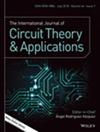A novel topology of a non‐isolated bidirectional multiphase single inductor DC–DC converter
IF 1.8
3区 工程技术
Q3 ENGINEERING, ELECTRICAL & ELECTRONIC
引用次数: 0
Abstract
This paper introduces a novel topology for a non‐isolated bidirectional multiphase single inductor (BMPSIC) DC–DC converter. The proposed BMPSIC requires only a single inductor, irrespective of the number of arms, and features reduced volume and weight compared to the total magnetics needed for a conventional converter with similar ratings. The proposed BMPSIC advantages include a high DC voltage gain without operating on a large duty cycle, voltage stress on the power switches equal to that at the high‐voltage port, easy implementation, and a lower cost for application at high‐power densities. Furthermore, this topology requires only one current and voltage control loop. This paper thoroughly details the steady‐state operating principles of the inductor current continuous mode. It provides theoretical and mathematical analysis, including a comparative analysis of the proposed BMPSIC against earlier DC–DC converters, highlighting the superior performance and efficiency of the BMPSIC. An 8‐kW laboratory prototype, designed as a proof of concept, has been meticulously developed and tested, showcasing the performance of the converter across a broad range of load variations. The efficiency measured for the rated load exceeded 98.2% at the low‐voltage port of 250 V and the high‐voltage port of 400 V. Additionally, the article features Video S1, which illustrates the functioning of the converter.非隔离式双向多相单电感直流-直流转换器的新型拓扑结构
本文介绍了一种非隔离双向多相单电感(BMPSIC)直流-直流转换器的新型拓扑结构。与额定值相近的传统转换器相比,拟议的 BMPSIC 只需单个电感器,而无需考虑臂的数量,并具有体积小、重量轻的特点。拟议的 BMPSIC 的优势包括:无需在大占空比下运行即可获得较高的直流电压增益;电源开关上的电压应力与高压端口上的电压应力相同;易于实现;成本较低,适合高功率密度应用。此外,这种拓扑结构只需要一个电流和电压控制环路。本文详细介绍了电感器电流连续模式的稳态工作原理。它提供了理论和数学分析,包括对所提出的 BMPSIC 与早期 DC-DC 转换器的比较分析,突出了 BMPSIC 的卓越性能和效率。作为概念验证而设计的 8 千瓦实验室原型经过精心开发和测试,展示了该转换器在各种负载变化情况下的性能。在 250 V 的低压端口和 400 V 的高压端口,额定负载下测得的效率超过 98.2%。此外,文章还配有视频 S1,展示了转换器的功能。
本文章由计算机程序翻译,如有差异,请以英文原文为准。
求助全文
约1分钟内获得全文
求助全文
来源期刊

International Journal of Circuit Theory and Applications
工程技术-工程:电子与电气
CiteScore
3.60
自引率
34.80%
发文量
277
审稿时长
4.5 months
期刊介绍:
The scope of the Journal comprises all aspects of the theory and design of analog and digital circuits together with the application of the ideas and techniques of circuit theory in other fields of science and engineering. Examples of the areas covered include: Fundamental Circuit Theory together with its mathematical and computational aspects; Circuit modeling of devices; Synthesis and design of filters and active circuits; Neural networks; Nonlinear and chaotic circuits; Signal processing and VLSI; Distributed, switched and digital circuits; Power electronics; Solid state devices. Contributions to CAD and simulation are welcome.
 求助内容:
求助内容: 应助结果提醒方式:
应助结果提醒方式:


